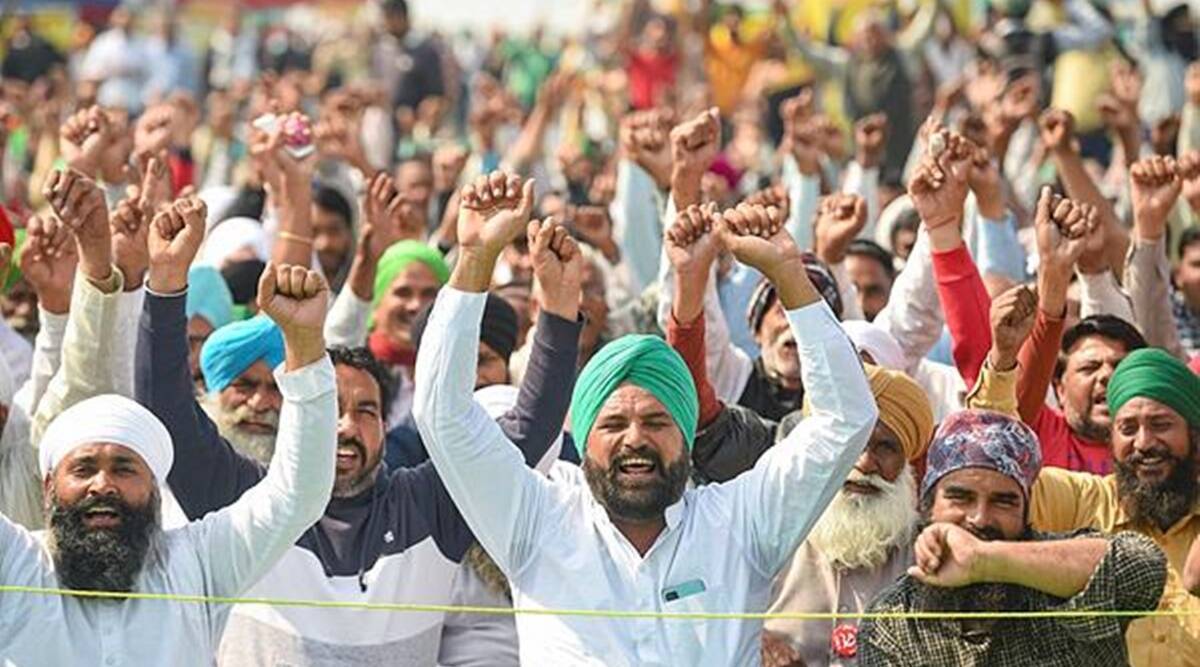 While the committee has announced names of the representatives of other farmer groups, it has not mentioned the names of representatives of the SKM that led the farmer agitation against the three farm laws. (PTI File PHoto)
While the committee has announced names of the representatives of other farmer groups, it has not mentioned the names of representatives of the SKM that led the farmer agitation against the three farm laws. (PTI File PHoto)Like the monsoons, just when everyone was giving up hope, it poured with a vengeance. The government made a commitment last year when it repealed the farm laws to constitute a committee. This body has finally been constituted to promote zero budget-based farming, change crop patterns and make MSP more effective and transparent. It is an exhaustive body of 28 members with cross representation from the Central and state governments, farmers, agricultural scientists and economists.
The new committee was preceded by a Supreme Court-appointed panel that in its wisdom spoke against the withdrawal of the controversial farm laws, saying that the “majority” of the farm unions supported them and a repeal would be “unfair to this silent majority”. Parking this issue for the time being, questions need to be asked about the composition of the new committee and the crux of its agenda.
Of the eight farmer members in the committee, five were nominated by the government and are known to be sympathetic to its views. Three were to be nominated by the Samyukt Kisan Morcha. But SKM’s boycott of the committee, citing under-representation, was a foregone conclusion.
Contrary to the expectations of those who supported the farmer agitation, many of the SKM members contested the Punjab elections and, predictably, lost spectacularly. Candidates identified with farmer protests met with the same fate in the UP elections. The SKM has lost much of its sheen and relevance. Unions should now strive to earn respect, not popularity.
Subscriber Only Stories
Many will criticise the committee for having farmers who mirror the government stand, which in my opinion is unfair. One may disagree with some of Anil Ghanwat’s views but he is a sensible voice on the committee. Vested interests need to be eliminated from the committee.
It is also a little curious that the Former Secretary, Ministry of Agriculture and Farmer Welfare Sanjay Agarwal has been appointed the committee’s chairman. He was at the vanguard of the misconceived government campaign on the farm laws. Agarwal should recuse himself from the position for the sake of propriety and, more importantly, to allow space for building the trust of those sceptical of the exercise. It is quite out of order for a NITI Aayog member with a rank and status of a Union Minister of State to be asked to serve as a member under Agarwal.
Again, the committee, by design, has no state representation from Punjab, a major grain procurement state. This could be used to whip up divisive sentiments in the state.
Like many who equate incomes with livelihoods, the committee’s mandate obscures changing cropping patterns with diversification. It is, at best, a subset of diversification. The agriculture department may have an understanding of the problems but it now needs to comprehend that they cannot be solved by having discussions centred around cropping choices and practices. Solutions require a systems approach. This cannot happen when the mandate is limited to crops, with the Secretary, Ministry of Animal Husbandry not even a member of the committee, even though one-third of all agricultural GDP comes from rearing animals. It reminds one of John Maynard Keynes’s perceptive comment: “The difficulty lies not in the new ideas, but in escaping from the old ones”. Given this state of affairs, it is not difficult to understand why things have gone so wrong and why there is a threat of them turning worse.
Like the lawyers in the US judicial system speculating on the ruling of a jury based on its composition, may I venture into unfamiliar territory, but confidently predict some of the major outcomes? The committee will propose to end the open-ended procurement of grains at MSP (wheat and paddy) while making MSP available to a larger number of farmers across India geographically. It will also end unlimited availability and access of subsidised fertilisers for all farmers by proposing to shift towards a mechanism of direct fertiliser subsidy transfer into farmer accounts. Lip service to natural farming will continue to be the norm. Lastly, the committee which has not been given a time frame to deliver the report and can be expected to circumambulate to eventually giving recommendations after the 2024 parliamentary elections.
For the rest, we seem to be wasting time squabbling over small mandates. We are limited by imagination as we lose largely unimagined opportunities of a food systems approach that are now deemed to be utopian. It will, in a few years, become essential thinking, making us reinvent the way we do everything.
The writer is chairman,
Bharat Krishak Samaj
- The Indian Express website has been rated GREEN for its credibility and trustworthiness by Newsguard, a global service that rates news sources for their journalistic standards.

